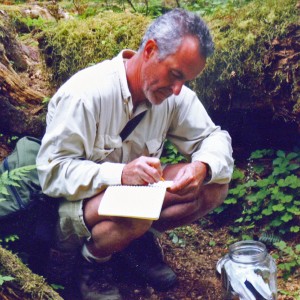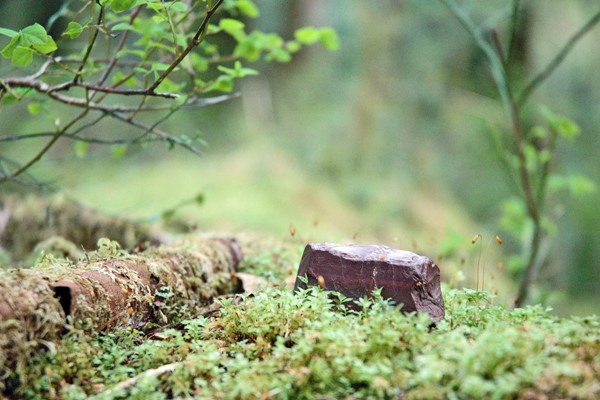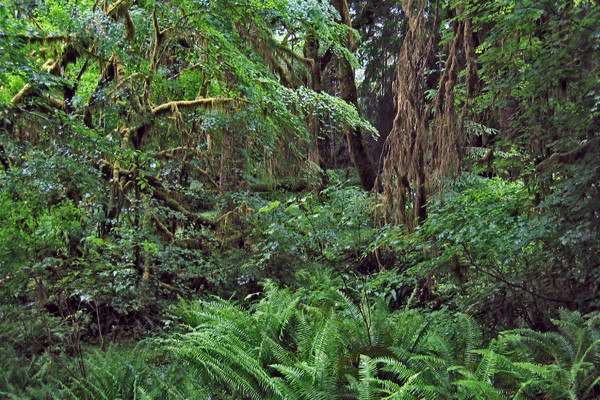Listen 來聽
The Diversity In Silence – Interview with acoustic ecologist Gordon Hempton
寂靜中的萬籟 – 訪問聲音生態學家戈登‧漢普頓
Listen 來聽 / Meanderings - Feature Story 咫尺 - 專題故事 / Feature: Recording as a way to understand ecology; listening to silence as a practice of conservation. 從錄音認識生態環境, 以寧靜作為保育起點。
Interview 採訪: Kwong Wing-ka/ 鄺永嘉
中譯: Kwong Wing-ka/ 鄺永嘉01/20/2015
noise, Olympic National Park, silence, stone, 噪音, 奧林匹克國家公園, 寂靜, 石頭
Gordon Hempton is an award-winning acoustic ecologist and the founder of “One Square Inch of Silence” campaign.
Gordon Hempton: http://soundtracker.com/
One Square Inch of Silence: http://onesquareinch.org/

Kwong Wing-ka : Can you share your listening experience with us?
Gordon Hempton: We all hear differently. Once I realized this is true then I stopped trying to listen to what other people hear and simply listen to what I can hear. This made my experience intensely personal. I can also not listen for something because how can a person listen for something they have not yet heard? I simply open up and listen to all sounds with equal importance much like a microphone. In fact, in order to become a better listener I found microphone is the perfect master to teach me.
During my listening experience I do not think about what I hear, I simply feel it. Sounds are turned into emotions that flood my awareness and are constantly changing. When I am in a wilderness area far from people I feel most aware, accepting, and peaceful ― this is why I have specialized in recording vanishing wilderness soundscapes around the planet. I hear the Earth as a solar powered juke box, playing music that is soul reaching. Why do I hear a bird singing as music? I evolved here, the Earth is my home. My process of nature listening is a spiritual pilgrimage back home.
Kwong Wing-ka : People always think that art / music is about making sounds. What do you think about silence, making sound and noise in art?
Gordon Hempton: For me, art/music is about awareness. If I see art and I suddenly feel greater possibilities then I feel more alive. Music that makes me want to dance confirms that I am alive. Silence in both place and mind is pure awareness. Silence is not the absence of something but the presence of everything.
Kwong Wing-ka : Can you tell us more about the ” One Square Inch of Silence ” campaign?
Gordon Hempton: There is not one place on planet Earth set aside off limits to noise pollution. Noise pollution has reached just about everywhere. Up until 2005 I thought it was someone else’s job, namely the National Park Service, to make good on its promise to preserve natural quiet and defend park lands and wilderness areas from the epidemic of noise. But a sudden loss of hearing in 2003 changed my life. I instantly was out of work and worse, my mind created inescapable noise ― whining and moaning. Quiet or silence was then impossible for me to achieve even for one moment. I lived the future if we do not save silence in wild areas. In 2005 my hearing recovered and I was so deeply grateful that I said, “I may not be able to save silence but I know I can try.” So on Earth Day, 2005, I hiked alone up the Hoh River Trail in Olympic National Park for 3.2 miles and found a moss covered log, then placed a single stone which I then promised to defend from all noise pollution.
People may ask what is good in such a small area. Well, it takes more than 1000 square miles without loud noise producing events, like a jet overflight, to protect a single square inch. I listened, when I heard noise at OSI (One Square Inch) I wrote letters to the owner of the noise, and in some cases they responded favorably, such as Alaska Airlines, Hawaiian Airlines and American Airlines that all made promises to restrict some flights. More importantly, OSI has become a shrine for silence and people from all over the world make this pilgrimage. This work has also become a non-profit foundation, the only one in the world of its kind.

Kwong Wing-ka : You have suggested that preserving natural silence is as important as species preservation and habitat restoration. Why it is important to keep a place without human-made sound?
Gordon Hempton: Please remember that lowering noise pollution is not the same as saving silence. And many people think that saving silence and designating places to be kept free from noise pollution seems high-minded and frivolous when compared to habitat restoration, species preservation, and toxic waste cleanup… the list goes on. But we can ask ourselves how important is it that we not only listen but can hear nature? The question might seem trite. But when we consider that hearing is awareness, and the loss of quiet is the loss of awareness, we can ask a new question: How important is it that we are aware? Obviously to solve any environmental problem, habitat, species, toxin… we must first be aware of our environment and listen. The quieter we are the more we hear. The more we are aware and the better able we are to solve other problems. I think the major environmental problem is that we think the problem is out there, in the environment, but the problem is really in here, our way of relating to the planet. When we are in a quiet place and can experience nature in an intensely personal way, we fall back in love with Earth. This is our singular ‘environmental’ problem–we have lost communication with the Earth. As in any love affair, communication is paramount.
Kwong Wing-ka : Even without human-made sound, there are many sounds in nature. What does silence means to you? How do you define silence?
Gordon Hempton: I define silence as the absence of noise pollution. The whole world is vibrating so to find the kind of silence that physicists define as the absence of all vibration in the audible spectrum of all animals is impossible. Silence is both outer and inner. There is a silence that is under even the noisiest places and spiritual leaders can hear it and still maintain awareness. I cannot. I must find silence in nature to recharge my inner silence–and then return to noisy places to be the person that I am by using that inner silence or calm to restore my awareness. Eventually, I feel my inner silence run low, as if a battery, then I return to nature and recharge.
Kwong Wing-ka : What is the most difficult thing when you are running this campaign ?
Gordon Hempton: The most difficult thing is for me to hear comments from even environmentalists that silence cannot be saved. “Why do they choose to believe this?” I wonder if they have fallen out of love with Earth and are faking romance. When we love something or someone, we simply do what needs to be done to save it. It is that simple. So to answer the question more directly, the most difficult thing about this campaign is many (possibly most) people have never heard silence.
Kwong Wing-ka : Do you have any suggestions for people who want to start a similar project in their home country?
Gordon Hempton: Find a stone, place it somewhere, anywhere; make it your personal “One Square Inch of Silence”. In the silence that you discover, everything else will unfold. Quiet has a voice; you can ask it questions and it will answer–in first impulse of emotion. You will know when you are listening because your energy will shift from your head to your heart, much as it does when we are with someone we love.
聲音生態學家戈登‧漢普頓多次獲獎,備受肯定。他同時亦為保育組織「一平方吋的寂靜」的創辦人。
戈登‧漢普頓: http://soundtracker.com/
「一平方吋的寂靜」: http://onesquareinch.org/
鄺永嘉: 可以和我們分享你的聆聽經驗嗎?
戈登‧漢普頓: 我們聽到的東西都不一樣。當我明白這個真理時,我不再嘗試聽別人聽到的東西,簡單的聽自己能聽到的,這讓我的經驗極度個人化。我也不再聽某些事物,因為一個人怎能聽到他們未聽過的東西呢?我單純地打開耳朵,聆聽所有同等重要的聲音,就像麥克風一樣。事實上,為了成為更好的聆聽者,我發現麥克風是完美的導師。
當我聆聽時,我不會多想我聆聽到甚麼,我只感受它。聲音轉化為情緒,把我的意識淹沒,且不斷變化。當我在遠離人群的郊野區域時,我變得敏銳、包容和平和 — 這亦是為何我專門採集世界各荒野中消逝的聲境。我聆聽地球,就似聆聽播放著滋潤靈魂的太陽能點唱機一樣。為什麼我把聽到的鳥鳴當作音樂? 我進一步想,地球是我的家;我聆聽自然,是靈魂朝聖,是回家。
鄺永嘉:不少人認為藝術/音樂是關於製造聲音,你怎樣看藝術中的寂靜、聲音及噪音的製造?
戈登‧漢普頓: 對我而言,藝術或音樂是關於意識。當我看見藝術的時候,我會突然感到有更多的可能性,更有生命力。 音樂令我想起舞,令我確定自己的存在。環境及內心的寂靜是純粹的意識。寂靜不是某事物的消失,而是萬物的存在。
鄺永嘉: 可以介紹「一平方吋的寂靜」這個運動嗎?
戈登‧漢普頓: 在這地球上,沒有一個地方對噪音污染設下限制。噪音無處不在,在2005年之前,我覺得這只是某些人的工作,即美國國家公園管理局履行保存自然寧靜、確保國家公園及郊野不受噪音波及的承諾。但於2003年,突然失去了聽覺改變了我一生。當時我立即停止工作,不過更糟糕的是我腦海出現無法避免的噪音—抱怨及悲嘆。寧靜或寂靜對我來說根本是不可能達到的,就算只是片刻的時間。我們如果不保護郊野的寂靜,未來就像我的經歷一樣。 我的聽覺於2005年恢復,當時我非常感恩並說 :「我可能不能保存寂靜,但我知道我可以嘗試。」所以在同年的世界地球日,我獨自一人沿著赫河(Hoh River)山徑走了3.2哩,到達奧林匹克國家公園,找到一截覆滿苔蘚的枯樹樹幹,並把一顆石頭置於其上,承諾從今以後會與噪音污染對立。
有人會問保護範圍如此細小的地方,會有甚麼好處。如果要保護一平方吋的寧靜,超過一千平方公里的地方不能有噪音污染的活動,例如飛機在空中飛過。當我聆聽到有噪音在這一平方吋出現時,我會去信噪音源頭的負責人,有時會得到很好的回應,例如阿拉斯加航空、夏威夷航空及美國航空,他們均承諾作出飛行限制。更重要是,「一平方吋的寂靜」成了寧靜聖地,世界各地的人均可以來朝聖。同時它亦成為一個非牟利組織,是世上唯一一個。
鄺永嘉: 你指出保存自然中的寂靜,如同物種保育及棲地復育般重要,為什麼留住一個沒有人類製造的聲音的地方是如此重要?
戈登‧漢普頓: 請記著減低噪音污染並不等於保護寂靜。不少人覺得保護寂靜,成立一個不受噪音污染的地方,相對於棲地復育、物種保存及有毒廢物清理等數之不盡的議題,是過於理想及瑣碎的。但我們可以問自己,到底我們在聽之餘,真正的去傾聽自然是有多重要?這問題看似是老生常談,但如果我們把聆聽麾視為意識,而失去寧靜是失去意識的時候,我們可以問一條新問題:意識對我們來說有多重要?很明顯,解決環境問題,諸如棲地、物種及毒素……等,我們首要的是關注環境及聆聽。我們身處愈寧靜的地方,我們愈會聽見更多。我們關注更多,才可更好地解決其他問題。我想最核心的環保問題是,我們以為問題就在那兒,但問題其實在這裡,是我們連繫地球的方式。當我們在寧靜的地方,以極為私人的方式去感受自然,我們會再次愛上地球。這是我們唯一的「環境」問題-我們失去了與地球的交流,就像所有愛情一樣,交流永遠是最重要的。
鄺永嘉:就算沒有人類的聲音,自然中仍有不少鼙聲音。寂靜對你來說是甚麼?你怎樣定義寂靜呢?
戈登‧漢普頓: 我會定義寧靜為沒有噪音污染。整個世界都在振動,如果照物理學家定義-寂靜是沒有任何動物能聽見的音頻振動的話,這根本不可能。寧靜是外在的,亦是內在的。有一些寧靜是隱藏於最吵雜的地方,精神領袖們可以聽到而且持續關注,但我不能。我需要在自然中找尋寧靜來回復內心的寧靜。然後返回嘈雜的地方後,我就用內心的平靜來回復我的關注,最後當我感到內心的寧靜不足時,就像一顆電池般,我就返回自然來「充電」。
鄺永嘉:發起運動最困難的地方是甚麼呢?
戈登‧漢普頓: 對我來說最困難的事情是聽到一些環保份子說寧靜是不可能保存。我總是會想:「為甚麼他們會如此相信的呢?」我好奇他們對地球的愛是否假的,當我們愛上某人或某些事物時,我們就會做需要做的事來保護他,就是這樣簡單。所以,簡單及直接來回應這問題,這個運動最難的是不少人(甚至是大部份人)還未聽過真正的寧靜。
鄺永嘉:對於想於不同地方發起相似計劃的人,你有甚麼建議?
戈登‧漢普頓: 找一塊石頭,把它放在某處,或任何一處,把它當作你自己的「一平方吋的寂靜」。在寂靜之中你會發現所有東西會展現出來。寂靜是有聲的,你可以向它提問,它會回答-以第一刻的情緒衝澈。當你聆聽時,你就會知道,因為你的力量會由腦部轉移到心,就像我們與心愛的人在一起的感覺。

In the forest of Olympic National Park.
在奧林匹克國家公園之中